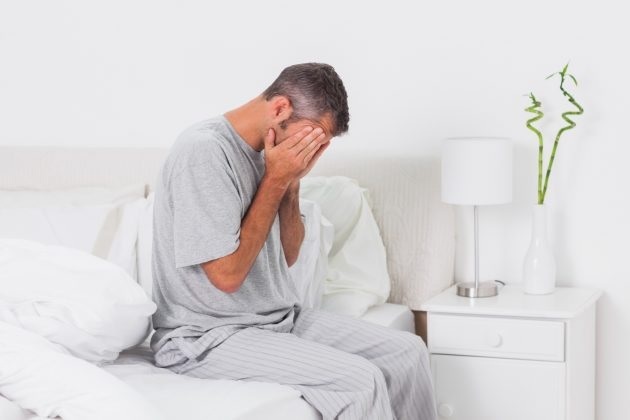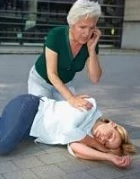Causes and symptoms of orthostatic hypotension
Contents:
- Causes of orthostatic hypotension
- Causes of orthostatic hypotension
- Neurocirculatory dystonia
- Problems with endocrine system
- Side effect of
- preparations Fasting, dehydration, deficiency of minerals
- Varicose disease
- Diseases of the digestive tract
- Overeating, allergy, inflammation
- Treatment of
 Orthostatic hypotension -Body in an upright position. When you get up, a person feels weak, his eyes darken. What is the reason for this phenomenon, how to treat it, is this symptom dangerous, as well as the diseases that provoke it?
Orthostatic hypotension -Body in an upright position. When you get up, a person feels weak, his eyes darken. What is the reason for this phenomenon, how to treat it, is this symptom dangerous, as well as the diseases that provoke it?
Orthostatic hypotension is manifested by symptoms such as weakness, darkening in the eyes or a sense of white flies. Other signs:
- Noise in the ears.
- Dizziness.
- Weakness.
- Loss of consciousness or stunning.
Causes of orthostatic hypotension
A slight decrease in blood pressure( up to 10-20 mm Hg) on rising is a normal reaction in all people. In the regulation of BP participates vasomotor center of the medulla oblongata, receiving signals from the carotid sinus. It is located between the inner and outer carotids. Signals from the carotid sinus go into the medulla oblongata, from which, when you get up, the command "narrow the blood vessels" comes in to increase blood pressure.
But with pathological orthostatic hypotension, the arteries do not respond to the shift of the posture. There is a sharp bleeding of the brain, so that a person may lose consciousness or darkening in the eyes, because in this case, BP decreases by more than 20 mm Hg.
 Learn about the lack of oxygen in the brain and how to treat hypoxia.
Learn about the lack of oxygen in the brain and how to treat hypoxia.
Read about the causes of sudden syncope and first aid to the victim.
Why do such drastic changes occur? Most often, this disorder is a consequence of improper regulation of vascular tone. The causes of orthostatic hypotension:
- VSD.
- Endocrine problems.
- Lack of vitamins, macro-, microelements, nutrients in starvation and poor assimilation.
- Dehydration.
- Varicose veins.
- Diseases of the digestive system( liver, pancreas, intestines).
- Some drugs for the treatment of hypertension, coronary heart disease( beta-blockers, Nitroglycerin).
- Overeating( postprandial hypotension after eating).
- Allergy, inflammatory processes of the body( excretion of kinins, histamine).
- Heart Disease.
Neurocirculatory dystonia
Vegeto-vascular dystonia is a violation of the regulation of the vascular tone, carried out by the autonomic nervous system, which is outside the volitional control of a person. The sympathetic department causes a narrowing of the vessels, an increase in their tone and an increase in blood pressure. This effect is realized through the action of mediators adrenaline and norepinephrine. The parasympathetic department causes expansion and a decrease in pressure due to the action of acetylcholine.
With neirotsirkuljatornoj dystonia occurs failure of regulation of a BP.The influence of the sympathetic vegetative department is weakened, which leads to a collapse, in other words, a loss of vascular tone. Therefore, the vessels do not have time to narrow to prevent a sharp decrease in blood pressure, a person can fall into a faint. The predominance of the parasympathetic nervous system also leads to orthostatic collapse.
Problems with the endocrine system
The regulation of pressure and tone of the arteries, in addition to the autonomic nervous system, affects the hormones of the adrenal and thyroid glands. The adrenal glands secrete cortisol, which enhances the vasoconstrictor effect of adrenaline. With insufficient allocation of hydrocortisone, the tone of the vessels is weakened. Therefore, hypoadrenia, insufficient function of the adrenal cortex lead to orthostatic collapse and loss of consciousness.
The second hormone of the adrenal gland aldosterone maintains a normal blood volume in the cardiovascular system by delaying sodium and water in the body. With his deficiency, the perfusion of the brain cells with blood naturally decreases, which leads to loss of consciousness or darkening in the eyes with a sharp rise.
Thyroid hormones also increase the effect of catecholamines( adrenaline, norepinephrine) on the arteries. With a lack of thyroid hormones( thyroxine, triiodothyronine), the tone of the arteries decreases, the heart rate slows down, which can lead to episodes of orthostatic collapse.
Glucagon - one of the hormones that can indirectly affect blood pressure, increases blood glucose. With its lack, which may be a consequence of pancreatitis, blood sugar drops, which causes the CNS to slow down, in particular, the activity of the vasomotor center.
Side effect of
preparations Orthostatic collapse can cause the following drugs:
- Vasodilators: No-sppa( Drotaverin), Papaverin.
- Hypotensive drugs for hypertension: betablockers( Egilok, Concor).
- Diuretics( Furosemide).
- Nitrates for the treatment of coronary heart disease( Nitroprusside, Nitroglycerin, Monochinkwe).
 Hypotensive drugs have a depressing effect on the sympathetic nervous system. Nitrates also reduce venous return.
Hypotensive drugs have a depressing effect on the sympathetic nervous system. Nitrates also reduce venous return.
Fasting, dehydration, deficiency of minerals
Full nutrition without long breaks between meals helps maintain normal blood pressure. The lack of minerals, such as sodium, on the contrary, contributes to hypotension. The drop in glucose level during hunger causes hypotension due to inhibition of all metabolic processes.
Dehydration with excessive sweating, vomiting, diarrhea, insufficient water consumption leads to a decrease in the volume of circulating blood and a general violation of hemodynamics. In conjunction with the loss of vascular tone, this leads to a drop in pressure and bleeding of the brain, especially when you get up.
Varicose disease
Veins of the lower limbs play an important role in the maintenance of normal hemodynamics. They bring the blood back to the heart. With varicose veins, there is no complete return. This leads to hypotension.
Varicose veins - a consequence of the weakness of connective tissue( hereditary dysplasia or lack of vitamins and minerals).Violation of the function of veins and the weakening of their walls leads to a lack of vitamin C, which is involved in the synthesis of collagen. Magnesium deficiency is also a common cause of poor connective tissue.
Diseases of the digestive tract
Such digestive tract diseases as gastritis, ulcer, pancreatitis, can cause a sharp drop in blood pressure when the body is moved to a vertical position. The digestive organs are controlled by the parasympathetic system, namely the vagus nerve. With ulcers of the stomach, he is irritated, which causes his activation and the realization of all effects. Excessive influence of the vagus nerve, called vagotonia, leads to vasodilation and inhibition of the heart.
 Did you know that after losing consciousness, a person may have seizures? What is the danger of bettlepsy: symptoms, treatment, complications.
Did you know that after losing consciousness, a person may have seizures? What is the danger of bettlepsy: symptoms, treatment, complications.
Find out what a sunstroke is: causes and consequences for the victim.
Pancreatitis - inflammation of the pancreas, can also be a cause of weakness and darkness in the eyes when getting up. The mechanism here is both in stimulation of the vagus nerve, and in the formation of products of tissue decay when the enzymes of the gland act on them. After all, when the pancreas is inflamed, its enzymes are released into the bloodstream, destroying the tissues into which they enter. Kininy - the products of the decay of body tissues - reduce pressure, dilating blood vessels and reducing overall peripheral resistance.
Overeating, allergy, inflammation
Abundant food intake provokes a decrease in pressure, disrupts its regulation, as there is a redistribution of blood that has gone to the digestive organs. The wandering nerve plays an important role in postprandial hypotension.
Allergic, inflammatory processes are accompanied by the release of vasodilators - kynin, histamine.
Treatment of
This symptom is in the competence of a neurologist. Treatment of orthostatic hypotension should be comprehensive, aimed at normalizing the way of life. Regular meals without large breaks with the inclusion of useful foods in the diet will reduce the frequency of attacks.
Correction of endocrine disorders in the endocrinologist after the delivery of thyroid hormones, adrenal glands is also necessary. Massage, physiotherapy exercises, spa treatment improve the general condition.
A sharp drop in blood pressure when getting up can be a symptom of lack of sleep or hunger. However, with frequent attacks, a complete examination of the nervous and endocrine system is necessary. It requires support of the body, a healthy lifestyle.
write the question in the form below:



